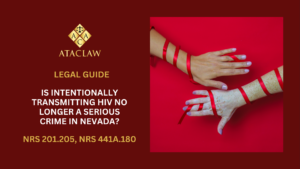Nevada law has experienced a pivotal transformation with the repeal of NRS 201.205, pivotally changing how cases of HIV transmission are addressed. Previously categorized as a serious felony, the intentional transmission of HIV carried with it severe legal repercussions. Now reframed under NRS 441A.180, the intentional spread of any communicable disease, HIV included, is classified as a misdemeanor. Offenders may face penalties of up to six months in jail and/or up to $1,000 in fines—a substantial shift from previous guidelines.

Can You Be Charged for Transmitting HIV in Nevada?
In Nevada, the act of transmitting communicable diseases, including HIV, falls under specific legal scrutiny and can indeed constitute a crime, depending largely on the context and behavior of the individual. Nevada’s legal framework outlines several scenarios under which a person’s actions could lead to criminal charges:
- Engaging in behaviors that carry a significant risk of passing a communicable disease to others. One common example is the use of shared needles.
- Working within professions where the likelihood of spreading a communicable disease is high. A frequently cited example is engaging in sex work.
- Deliberately infecting another individual with a communicable disease. This includes having sexual relations with someone while misleading them about your disease-free status.
It’s essential to note, however, that simply not using protection, such as condoms, is not enough to establish the intent to infect another person under Nevada law. Yet, courts may consider this among various factors when assessing the overall evidence.
How Can You Defend Against Charges of Transmitting HIV in Nevada?
Facing charges for the transmission of HIV can be a daunting prospect, but there are several defenses that can potentially be employed to combat these charges effectively:
1. Unawareness of HIV Status: A critical defense centers around the lack of knowledge regarding one’s HIV-positive status. In situations where you were unaware—and had no justifiable reason to be aware—that you were infected with HIV, this lack of awareness could preclude a conviction. For instance, receiving an incorrect test result indicating you were not infected could serve as evidence that you were unaware of your HIV status.
2. Absence of Intent or Reckless Behavior: If there was no deliberate intention to transmit HIV or engage in behavior that posed a significant risk of transmission, this could negate the charges. This could be relevant in cases where you are accused of sexual transmission. Demonstrating that precautions such as using condoms were taken or presenting medical evidence that your viral load was undetectably low could support your defense.
3. Informed Consent: Another pivotal defense is the concept of informed consent. If there was a mutual understanding and agreement between you and the other party, where the latter was fully aware of your HIV-positive status, comprehended the possibility of transmission, and nonetheless consented to activities like sexual intercourse or needle sharing, this informed consent can be a strong defense.
What Are the Legal Consequences of Deliberately Transmitting HIV in Nevada?
The ramifications for knowingly spreading HIV in Nevada have seen significant adjustments over time, reflecting shifts in societal and legal perspectives regarding the disease. Understanding the current legal penalties and the history behind them provides insight into how Nevada handles such sensitive and serious public health issues.
Current Penalties Under NRS 441A.180
Today, the intentional transmission of HIV in Nevada is addressed under NRS 441A.180, which categorizes this act as a misdemeanor. This classification represents a move towards less severe legal consequences for individuals found guilty of this charge. Those convicted can face:
- A maximum jail sentence of up to six months, and/or
- Monetary fines not exceeding $1,000.
This approach marries legal enforcement with a nuanced understanding of public health considerations, aiming to balance punishment with the state’s broader health objectives.
Historical Context: Penalties Under the Repealed NRS 201.205
Historically, Nevada took a more stringent stance. Before its repeal, NRS 201.205 treated the intentional spreading of HIV as a category B felony, a classification reflecting the serious nature of such an act. Under this former statute, penalties were considerably harsher, including:
- Incarceration for a period ranging between 2 to 10 years in the
- Nevada State Prison, and/or
- Fines reaching up to a staggering $10,000.
The transition from treating intentional HIV transmission as a felony to a misdemeanor indicates Nevada’s evolving legal and social approach to handling HIV/AIDS, moving towards strategies that focus not only on punishment but also on education, prevention, and the dignity of those living with HIV.
This nuanced approach underscores the importance of staying informed about the legal environment surrounding health issues in Nevada, emphasizing responsible behavior, the significance of consent and transparency, and the ongoing battle against the stigma associated with HIV/AIDS.
For further legal assistance and to discuss your case with an expert, don’t hesitate to contact ATAC LAW.
